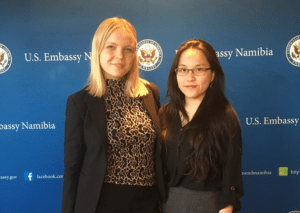By Emma Ziegler Steen and Jenna Tan
The Lawyers Without Borders (LWOB) Student Division at UCL has for the past six years been engaging in research, fundraising, and publicity work to aid Lawyers without Borders’ humanitarian efforts in upholding the rule of law internationally. As part of the UCL Division’s work, its Research Team took part in LWOB’s Rule of Law Innovation Challenge (ROLIC). The team, consisting of UCL Law students Jenna Tan, Antoni Micocki, Romy Ng, Laure Sty, Lynn Temp, Markéta Lisková and Emma Ziegler Steen, submitted a booklet concerning practical and legal tools for victims of gender-based violence in Kenya. The judges of ROLIC were impressed by the booklet and invited the UCL team to create similar educational material from a Namibian perspective to form part of LWOB’s outreach programme there.

After successfully creating a booklet exploring the legal framework of gender-based violence in Namibia we were invited to join LWOB’s delegation, as members of the UCL Division’s team, to a trial advocacy conference in Namibia to share our findings. The five-day advocacy conference which aimed to share best practice in tackling gender based violence for local legal practitioners, including judges, lawyers and local and international experts, was organised by Lawyers Without Borders and the United Nations Office on Drugs and Crime (UNODC) and took place in Windhoek, Namibia in June 2019.
Arriving in Windhoek a day before the conference was set to begin, we spent the first day meeting the speakers, who would be giving presentations on trial advocacy and gender-based violence throughout the conference. It was truly inspiring to meet the trainers, who were all experts in their fields and had careers as judges, solicitors or academics in numerous different countries.
During the days of the conference, participants from the Namibian Prosecution Service and other partaking legal practitioners were given tools to successfully litigate cases involving gender-based violence, thereby seeking to combat the very low conviction rate of these cases. Through presentations and training sessions, we and the participants came to understand the challenges facing prosecutors and victims in gender-based violence cases and how these detrimentally affect the rule of law in Namibia and beyond. Moreover, we came to grasp how these challenges intersect with wider legal and development-related issues, as stakeholders such as the Namibian Law Society, the US Ambassador to Namibia and the Namibian Prosecutor General generously shared their experiences during the conference.
As part of the training activities, participants to the conference were given copies of the booklet we and the other members of the UCL Division’s Research Team created. It was fascinating to get the opportunity to discuss the contents of our booklet with legal practitioners, who work daily to counter gender-based violence in Namibia. Moreover, it was inspiring to learn how the participants intended to share the booklet and its ideas with the populations of their home villages, as LWOB and the UNODC had generously made copies of the booklet available to each participant. Hopefully, our booklet’s simple language and visual illustrations will be effective in giving the wider Namibian population an understanding of the unique challenges in combatting gender-based violence.
We are thrilled that our product will reach the many individuals for whom gender-based violence is sadly still very common. In this way, we hope it might inspire victims to use the avenues of help, which our booklet is raising awareness of, to stand up against the violence. It would never have been possible to reach this goal without the generous financial support from the UCL Centre for Access to Justice and the UCL Law Society. Thank you for the faith you showed in us and the project.